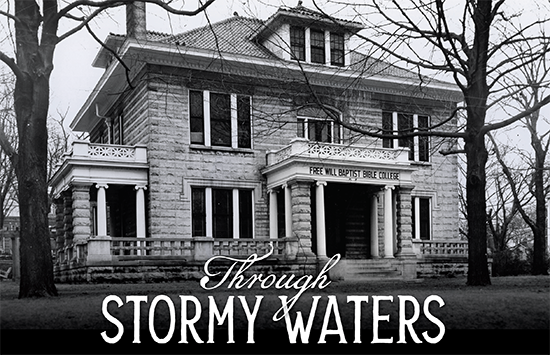
December 2020- January 2021
Passing the Faith
------------------
|





Through Stormy Waters
By Todd Parrish
It was September 1942, and the entire world was ablaze from the fires of another World War. In the islands of the South Pacific, 18-year-old American boys were storming the beaches of Guadalcanal; while in England, General Eisenhower huddled with generals to discuss plans to invade North Africa. Soon, college-age young men would begin the effort to free the African continent from Hitler’s grip and start the long, northward march toward Berlin and liberation.
At the same time, in Nashville, Tennessee, a young preacher from Southern Illinois sat waiting on the steps of 3609 Richland Avenue. A brand-new Bible college was opening, and its new president was arriving from Georgia to oversee its beginning. Paul Ketteman would soon be joined by other students who, along with Rev. and Mrs. L.C. Johnson, would usher in the start of Free Will Baptist Bible College, now Welch College.
Starting a college in the middle of a world war was a daunting task. The fact the college survived beyond the first semester of operation boggles the mind when one considers the sponsoring denomination was only seven years old, and the first class numbered only ten students. Hailing from small towns such as Beulahville, North Carolina; Glennville, Georgia; Macedonia, Illinois; and Monett, Missouri; these young men and women, along with a handful of dedicated faculty members, ushered in a school whose worldwide influence and gospel impact continues 78 years later.
What was the secret to their success? How did Welch College navigate that first year with a handful of students, limited resources, and a world in chaos? What lessons can we learn, given our own challenging circumstances during a worldwide pandemic, political unrest, limited opportunities to gather for church services, and college students’ concern about the future? When considering the answers to these questions, three explanations come to mind.
They were confident in their calling. Those first students were convinced Welch College was the place for them. These men and women came to college despite the possibility of being drafted into military service. One student, future missionary Dan Cronk from Michigan, left the college during the second semester to serve in the U. S. Army. The class minutes from March 4, 1943, read, “This class meeting was held in honor of Dan Cronk, who had been drafted into the army. We are sorry to lose one of our students but feel that the Lord will use Dan to spread His gospel in the armed services of our country.” Even when losing a classmate sent to fight for our freedom, these students felt this provided another opportunity to serve the Lord.
That student who arrived before everyone else, Paul Ketteman, answered the call to ministry while still a teenage boy on his parents’ Illinois farm. Reflecting on his father’s testimony, Greg Ketteman remembered, “Dad came to Bible College knowing God had called him to preach. Even though a lot was going on in the world, Dad never doubted what God wanted him to do with his life, and that’s why he was determined to be the first in his family to go to college, and a Bible college at that.”
Other early accounts testify these first students were assured serving Christ was their chief duty in life, despite circumstances, world events, and overwhelming obstacles. Their confidence in what God had called them to do sustained them in those early days; and in doing so, the foundling college persevered through its infancy.
They cared about their companions. Many large colleges and universities boast of thousands of students. Professors at these large institutions rarely take time to get acquainted with their students personally or to invest in their personal lives. During the war years, care and compassion for one another was evident on campus. “They were a family,” Greg Ketteman recalled his father saying about the early days. Even though the handful of students came from various backgrounds, their love for each other and the faculty’s concern for them was evident. The college existed in one building during those first years. According to Robert Picirilli, “one of the floors of Davidson Hall [the sole building owned by the college] was the Johnson family apartment [the president’s family]; another floor served as the dormitory for the girls and two women staff members; the lower floor had the only classroom, the chapel, offices, and dining hall. The garage out back was the boys’ dormitory.”
The close quarters promoted the family atmosphere and fostered some good-hearted fun. Picirilli recounted the following story at the college’s 25th anniversary celebration. “One evening, college president Dr. L.C. Johnson stopped by the garage-dormitory that housed the male students. Unknown to him, the young men had altered the supports in one of the bunks as ‘payback’ to a prankster-roommate. When it became evident Dr. Johnson was going to seat himself on the rigged bunk in order to visit the young men, Paul Ketteman immediately jumped up from his chair to offer it to the president, who humbly refused and said, ‘No, thanks, I’ll just sit here on the bed.’” Picirilli went on, “You can imagine the color of Dr. Johnson’s face when he crawled up from the floor between the bed steads. He mumbled something about having spoiled somebody’s fun and left.”
In spite of all the inconveniences of attending a fledgling college with limited facilities, these first students were focused on caring for each other in a fun and loving way.
They were committed to the Great Commission. Many who came that first year were the first in their families to attend college. During that era, preachers and those devoting themselves to vocational ministry were not encouraged to obtain a college degree. Recalling that first class, veteran Free Will Baptist pastor George C. Lee recalled, “I knew many of them personally, and what stood out to me was the fact that they were committed to the gospel. In that first class were future Free Will Baptist pastors and missionaries who would make a lasting impact for the Kingdom and the denomination.”
When asked what motivated Paul Ketteman to attend an upstart Bible college while all his friends were being drafted into a wartime military, his son Greg recalled his dad’s commitment to serve the Lord while in high school, before ever coming to Nashville and Welch College. His father knew the possibility of being called to go and serve in World War II, but he never wavered from the higher call on his life to serve as a good soldier of Christ. This commitment to the gospel motivated those first students to carry the gospel from the rural communities of America to the villages of North India.
Currently, we find ourselves in situations somewhat similar to those encountered by the first college students who began their education within these halls of Welch College. Trying to navigate the stress of furthering one’s education during a worldwide pandemic bears some similarity to attending college in the midst of a world war. But these students who experienced their college years within the confines of that single building on Richland Avenue forever impacted the Kingdom.
They came to Tennessee confident in their calling and the One who called. These student-pioneers, along with a handful of godly leaders, truly cared for one another and forged relationships that would last for the rest of their lives. And, in spite of all the various tasks God called them to perform, they remained resolute that wherever Christ placed them, it would be a place of service, sacrifice, and sharing the gospel of Jesus with lost souls.
The things that enabled them to chart their course for Christ successfully are just as beneficial for us today. Being confident in our calling, caring for our companions, and staying committed to the Great Commission will allow us to sail through the stormy waters of this current time with the same success as those Welch men and women of ’42.
About the Writer: Todd Parrish is director of church relations at Welch College. Learn more about the history of Welch College in Light and Truth: a 75-Year Anniversary Pictorial History of Welch College by J. Matthew Pinson and Phillip Morgan: welch.edu/welchpress.
|
|

